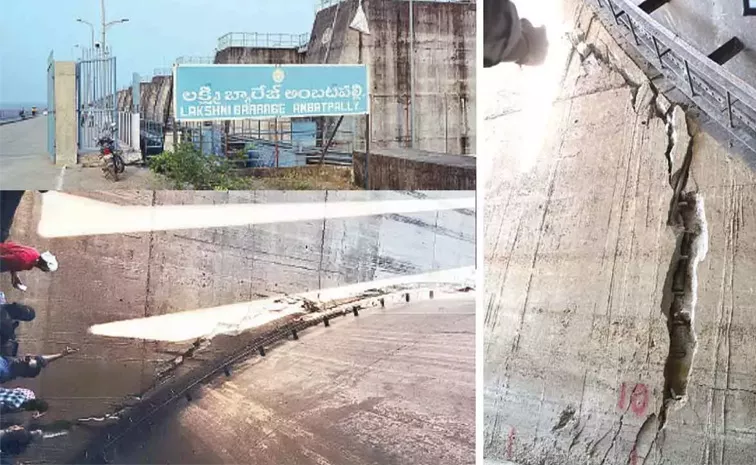
NDSA Flags Structural Failures in Kaleshwaram Barrages, Urges Urgent Repairs
Report reveals serious design and construction lapses; Rs 600 crore required for corrective measures
Hyderabad, April 24: In a significant development, the National Dam Safety Authority (NDSA) has released a damning report pointing to critical structural failures in the Medigadda (Lakshmi) Barrage, a key component of the ambitious Kaleshwaram Lift Irrigation Project (KLIP) in Telangana. The report comes in the wake of a major incident in October 2023, when six piers in Block 7 of the barrage sank, rendering the structure non-functional.
Responding to a request from the Telangana government on February 13, 2024, the NDSA constituted a high-level expert committee on March 2, 2024, under the Dam Safety Act, 2021. The panel was led by J. Chandrashekhar Iyer, former Chairman of the Central Water Commission (CWC), and included top engineers and scientists from CWC, NDSA, CSMRS, CWPRS, and IIT Delhi.
The committee conducted a comprehensive field inspection of the Medigadda, Annaram, and Sundilla barrages in March 2024. It held 36 internal meetings and examined vast technical documentation, including design drawings, construction records, and maintenance logs. The findings paint a grim picture of poor planning, substandard construction, and oversight failures.

Key Findings of the Report:
- Medigadda Collapse Causes:
The collapse of Block 7 was attributed to inadequate sand-bearing capacity in the foundation, failure of secant piles, and water flows that far exceeded the original design parameters. These engineering flaws were exacerbated by poor quality control during construction. - Issues Across All Three Barrages:
Similar concerns were observed in the Annaram and Sundilla barrages, where voids formed due to water storage pressures. The NDSA recommended that none of these barrages be used for water storage, but only for flow regulation, until further structural evaluation and reinforcement are completed. - Repair Infeasibility & Reconstruction:
The committee declared that repairing Block 7 was not technically viable. It recommended complete demolition and reconstruction, alongside redesigning downstream elements such as the stilling basin to ensure future stability. - Pre-Monsoon Precaution Urged:
The panel advised that immediate safety measures be taken before the 2024 monsoon to enable safe flood discharge. However, the report noted that these interim steps have not yet been implemented, raising fears of further deterioration.

Unheeded Warnings & Government Response
The report reveals that early signs of structural weaknesses were observed as far back as 2019, but were not addressed. The inclusion of the barrages under the Dam Safety Act came only in July 2023, by which time significant damage had already occurred.
The Telangana government has since directed construction giant Larsen & Toubro (L&T)—the original contractor—to carry out repairs and pending works at a cost of Rs 600 crore. Critics argue, however, that this is too little, too late.
Adding to the controversy, the NDSA flagged unauthorized grouting work undertaken without its approval, and the failure to perform mandatory geotechnical testing prior to construction. These oversights have triggered demands for accountability.
Political Fallout and Accusations
BRS leader K. Kavitha lashed out at both the Congress-led state government and the BJP-led Centre, accusing them of using the issue for political gain while farmers suffer the consequences. “The delay in addressing the structural problems is costing livelihoods,” she said, demanding that transparent repair protocols and punitive action against erring officials and contractors be ensured.
Farmers and Experts Raise Alarm
Farmers dependent on the Kaleshwaram project fear water shortages during the upcoming kharif season if repairs are delayed further. Experts warn that any failure during heavy floods could lead to catastrophic consequences, including downstream flooding and loss of irrigation supply to vast stretches of farmland.
Water resource analysts also criticized the fast-track construction of the Kaleshwaram project under the previous regime, alleging that technical due diligence was sacrificed for speed and optics.
NDSA’s Final Word: Act Now
The NDSA has called for a thorough review of the report by both state and central agencies, along with urgent and coordinated action. It emphasized that any further delay in repairs or safety measures would pose grave risks to people, property, and agricultural systems.
The ball now lies firmly in the court of the Telangana government, which must act swiftly to restore public confidence in the project and ensure long-term structural safety.


